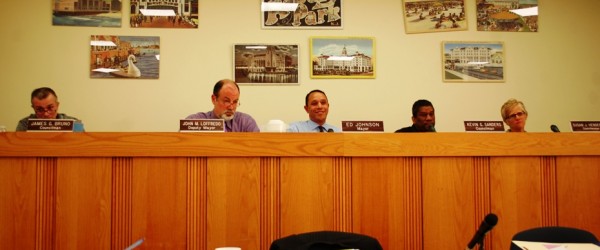Emergency budget appropriation approved
City seeks bond to make up for $1 million shortfall
A resolution enabling an emergency appropriation to close a $1 million gap in the 2012 municipal budget was approved unanimously at last night’s council meeting.
This resolution will allow the city to seek a $1 million bond to pay off a shortfall in the budget’s line item for employee health insurance.
Council voted on the resolution at the Sept. 19 council meeting, but Councilman James Bruno abstained from the vote. Because Mayor Ed Johnson was absent, this left only three council members — Deputy Mayor John G. Loffredo, Sue Henderson and Kevin Sanders — voting in favor of the resolution. The resolution required a two-thirds majority, so it did not pass at that time.
At last night’s meeting, the mayor was present but Bruno left before the vote was taken. Johnson, Loffredo, Henderson and Sanders all voted in favor of the resolution, so it carried.
Next, the city council will hold a public hearing and final vote on a bond ordinance allowing the city to borrow $1 million, to be paid back over five years.
City officials will go before the state’s Local Finance Board next Monday seeking approval for the emergency action, according to acting chief financial officer [CFO] Christine Paulin.
The city has taken action to bond the money because without paying the health insurance bill, the council and city manager Terence Reidy have said the city may be violating the law. According to city attorney Fred Raffetto, knowingly allowing an overexpenditure in a budget is a violation of budget law.
Since the $1 million shortfall was made public at the Sept. 19 council meeting, current and former city employees have publicly discussed who is responsible for the discrepancy. At last night’s meeting, Mayor Ed Johnson [pictured above, center] outlined several steps for dealing with the shortfall.
“We’re not going to stand in front of a burning house and argue over who bought the toaster,” Johnson said. “We’re going to work to minimize the impact of how we pay this bond as quickly as possible … We need to learn how to minimize our healthcare costs and we need to look for every opportunity.”
Finally, after the city deals with the financial situation, “there will be accountability, absolutely,” Reidy said. “Once we pay that bill we owe, we’re going to go through these steps and we most certainly will get to that step.”













